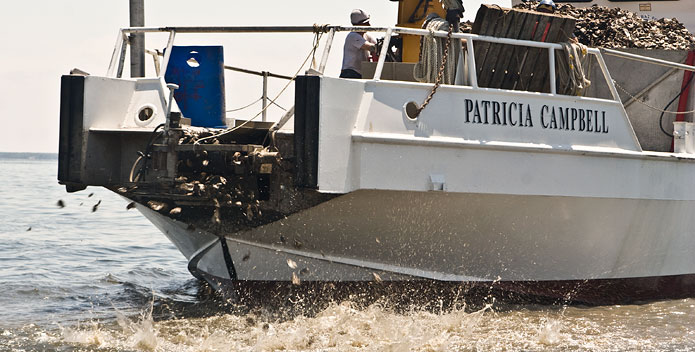Share this Story
Sowing Seeds for Tomorrow
Virginia Wesleyan University Students Supporting Oyster Restoration
University News | October 12, 2023
In the bustling harbor of Virginia's precious Chesapeake Bay, something quite remarkable is taking place. Virginia Wesleyan University (VWU) students, immersed in both academic pursuits and civic duties, have rolled up their sleeves to make a difference, extending their engagement beyond the confines of the classroom and into the vital waters of the bay. Their involvement in the Chesapeake Bay Foundation's Oyster Gardening Program isn't merely an activity; it’s a testament to their commitment towards environmental stewardship. 
Here’s how it works: the students receive two cages, each harboring spat-on-shell oysters, fragile yet potent symbols of life and potential. Under their attentive care, these oysters will evolve from their delicate state, eventually becoming mature adults, capable of benefiting the Bay’s ecosystem. Every oyster raised will be returned to the Chesapeake Bay Foundation (CBF) and transplanted onto sanctuary reefs, thereby enhancing the oyster population and contributing to the water's natural filtration process.
Bethany Tsiaras, Virginia Wesleyan University's Director of Civic Engagement and Service Learning, explains the broader value of the project, stating, "It’s about embedding a sense of responsibility, ecological understanding, and community spirit within our students. Not only are they learning the value of active participation in environmental preservation, but they are also contributing to a larger, life-affirming cycle that positively impacts the Chesapeake Bay."
A vital part of this initiative, the cleaning process, is meticulous and revealing, underscoring the significant impacts of small-scale, grassroots actions on broader ecosystems. During cleaning sessions, the cages are lifted from their watery home and tended to with diligence. The oysters are carefully cleaned of sea squirts and other potential inhibitors, while the cages are relieved of barnacles, crabs, and any residual aquatic hitchhikers, ensuring an optimal environment for the fledgling mollusks.
Reflecting on the project's significance, Tsiaras shares, "Each cleaned oyster, each scrubbed cage represents a microcosm of our broader environmental endeavors. The oysters, once matured, filter the bay, purifying the water and thus sustaining the marine ecosystem. Our students, by nurturing them, indirectly cater to the wellbeing of countless organisms within the bay. It’s a beautiful, cyclical relationship, manifesting the coalescence of education, engagement, and ecology.
"It’s heartening to witness our students immerse themselves in a project that resonates beyond our university, extending its influence to the myriad lives beneath the bay’s surface. As we anticipate the forthcoming Oyster Roundup in the summer of 2024, we are not just returning mature oysters to the CBF; we are sharing a chapter of our students' developmental journey, demonstrating how education, when intertwined with active civic engagement, can truly cultivate waves of positive change."

